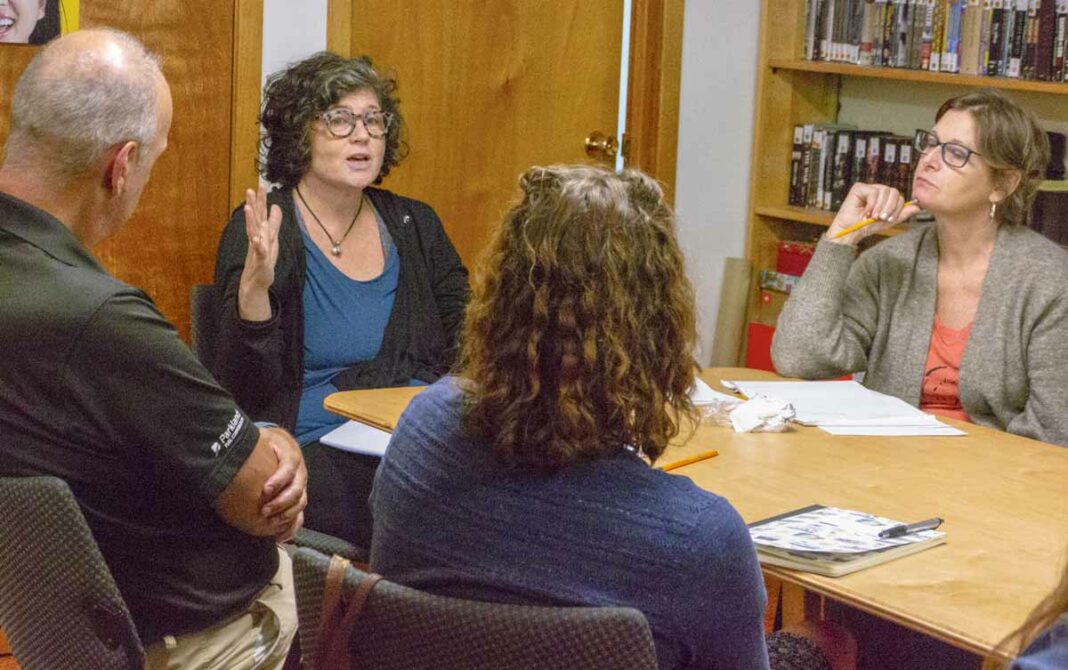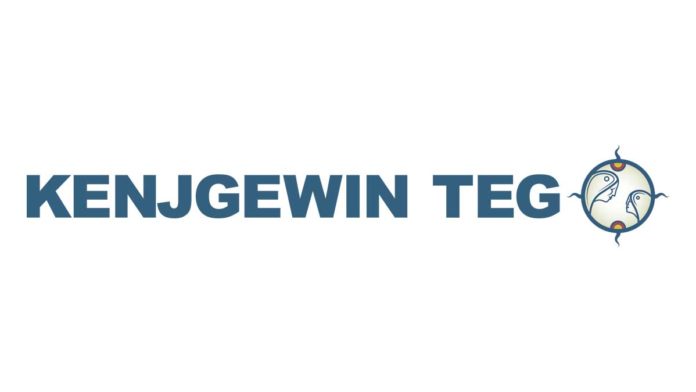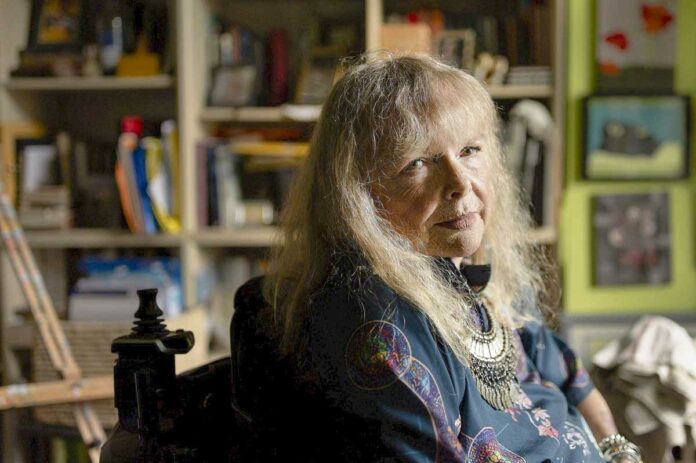by Isobel Harry
KAGAWONG—Hot on the heels of the Jabbawong Storytelling Festival held at the beginning of July, the first NorthWords Annual Festival of Words roared through Kagawong this past weekend.
Librarian and CEO Jill Ferguson, who has anchored the tiny but mighty town library for nine years, explained that the idea of a literary festival was originally “dreamed up” by Island librarians who had hosted author readings in their individual municipalities for several years. “NorthWords is in Billings now but the vision is for the festival hopefully to represent the whole Island.”
“Authors were invited with a view to encompassing all ways of communicating,” adds Ms. Ferguson. “And the organizing committee got things done!” The schedule ran without a hitch as innumerable volunteers in neon-green t-shirts greeted and oriented attendees to the events in various venues along the riverside edge of lower Main Street.
On Friday, the opening ceremony was led by the M’Chigeeng Ladies Drum Group singing ‘Manito Makwa,’ or ‘Medicine Bear Song,’ to a packed Park Centre audience. Words of welcome were spoken by Mayor Bryan Barker; Steven Debassige, representing Indigenous Tourism Ontario, said he was “here to celebrate those who have shared and continue to share their stories.”
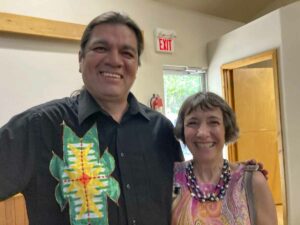
Introduced by library board and organizing committee member Barb Erskine, the keynote speaker, beloved Island writer, researcher and historian Shelley J. Pearen, acknowledged the land on which we all stood, “home of the Anishinaabe for thousands of years,” grounding the festival firmly in local history.
“In 1861, there were 77 Indigenous residents here. Fishing was the common activity, carried out from their purpose-built Mackinaw boats,” said Ms. Pearen. She noted that the first treaty of 1836, known as the Manitowaning Treaty, had affirmed the title of Indigenous people to Manitoulin and the adjacent islands. They lived and traded in Kagawong until the 1862 Manitoulin Island Treaty gave it over to be surveyed and occupied by settlers.
Her book, ‘Four Voices: The Great Manitoulin Island Treaty of 1862’ is a masterful account as told by four witnesses; copies of the fourth print run were being sold at the event.
“Inspired by the crowd’s enthusiasm,” she continued in her casual conversational style to describe the riveting historical facts for which she is so widely respected.
A descendant of Manitoulin settlers, Ms. Pearen related that one of her ancestors, the Reverend Jabez Sims, kept a journal in Anishnaabemowin in the 1860s; when she translated it she learned that Rev. Sims had been asked by the residents of Sheshegwaning to help annul the 1862 treaty. “This is what prompted my research into the Island treaties,” she said.
Shelley Pearen’s latest book, ‘Wikwemikong Diarium,’ published in three volumes, took 10 years to translate from the accounts kept by the French Jesuit priests in the years 1844 to 1863. She has given the sales rights to Wikwemikong Tourism; having sold out at NorthWords, copies of the Diarium may now be obtained by contacting wikytours.com.
“I started writing ‘Exploring Manitoulin’ (her indispensable guide to the Island) because I wanted to share stories; I wanted to get people to slow down and enjoy the Island. I encourage everyone to write,” the author concluded. “Just do it!”
The audience responded with a prolonged standing ovation.
Duke Peltier spoke next; elected five times as chief of Wiikwemkoong, he remarked that “the issues from 1862 are still not resolved.
“For many, they are hearing Shelley’s stories for the first time. The ‘Diarium’ and ‘Four Voices’ show what really happened. We need that knowledge to move together; we don’t want this history to keep being repeated. The more we all share the same information, the better we are and the more we can live in harmony.”
Duke Peltier’s thoughtful speech also got the audience on its feet.
Friday’s events concluded at Split Rail Brewing Co. in Gore Bay with ‘Book and Brew,’ author readings, music and tapas.
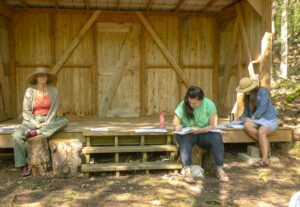
Saturday began with a workshop led by Sophie Anne Edwards, environmental artist, writer, founder of 4elements Living Arts, leader of the award-winning Billings Connections Trail and resident of Kagawong, entitled ‘A Poem is a River, a Map, a Dream of the World.’ Held within the deep-green leafy dell enclosing the Riverbend Stage, Ms. Edwards expertly led exercises designed to open minds to creativity, walking down to the river’s edge to choose a place in which to “collect sounds and words.”
Then it was down to the Market Pavilion where the Library Used Book Fundraising Sale tables groaned under the weight of hundreds if not thousands of books, “deeply discounted” for the day. Circling the pavilion were tables of local authors selling their wares: Chuc and Linda Willson, Mnawate Gordon-Corbiere, Donald Harry Roberts and many more. Michael Cywink, muralist and author, was busily creating a painting in honour of the festival. Ladies of the local Anglican church had packed lunches for sale for a small fee.
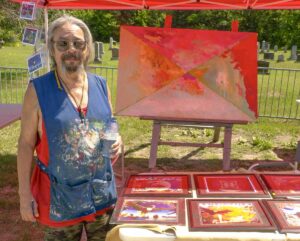
Two afternoon workshops were next, by Claire Ross Dunn, entitled ‘Mining your Life for Art,’ in the Billings Library and by Kirk Dunn, entitled ‘Colour with Kirk,’ in the Park Centre. The accomplished husband and wife team have numerous credits for major creative projects in film, television and theatre undertaken both separate and together since the 1980s, mainly out of Toronto.
Their appearance at NorthWords also supported the festival’s Saturday evening feature performance of the play they co-wrote and co-produced entitled ‘The Knitting Pilgrim,’ starring Kirk Dunn.
Once again, it was standing room only at the Park Centre for the acclaimed one-man show. The stage floor was empty save for three baskets filled with balls of wool and knitting needles; on the three large screens facing the audience were exhortations to “Get knitting” and “Look through the baskets.”
Soon, Kirk Dunn was sitting on a stool to the right of the main stage area, knitting an impossibly long and colourful scarf and teaching the audience how to knit, the stitches projected behind him. Several audience members followed along with knitting implements from the baskets.
“Knitting keeps me sane,” Mr. Dunn declares as he launches into how he came to pick it up. In short order, we meet his father, a Presbyterian minister, on one of the screens, and his grandfather and great-grandfather, also ministers, and figure out they had a major influence on his Christian faith.
Determined “to broaden understanding among religions,” no less, he began to knit church-window-sized panels to depict the three main pillars of the Abrahamic faiths, Judaism, Christianity and Islam, calling it the Stitched Glass project.
Mr. Dunn is rueful, funny and honest about the difficulties of trying to be an artist while raising two children and running out of arts council funds. Encouraging him to keep on knitting through adversity is Claire Ross Dunn, his wife and unflinching supporter whom he credits throughout.
What could be the possible denouement in a play about knitting? Will it all unravel? The screens come alive with the pithy reflections of a rabbi, Mr. Dunn’s father the minister and an imam, expounding gently about the sometimes surprising similarities among their religious systems.
The actor transforms before our eyes into an advocate for world peace through art. “Our time together,” says Mr. Dunn while explaining that some of the admissions money will be donated to Wiikwemkoong’s Debajehmujig Storytellers, “is working together for peace.”
And finally, at the very end of the hour-long performance, the screens come tumbling down. As the audience audibly gasps, we gaze in awe at the three Stitched Glass panels, each nine feet by five feet, depicting the symbols and struggles of the three religions in brilliant colour, all of them knitted by hand by one man and having taken a total of fifteen years to complete.
The audience is on its feet, examining the panels and meeting the author/actor/knitter. This is what theatre should be: thought-provoking and wildly imaginative. It sums up the NorthWords Festival in many ways; you just know the audience will be back for next year’s edition.

